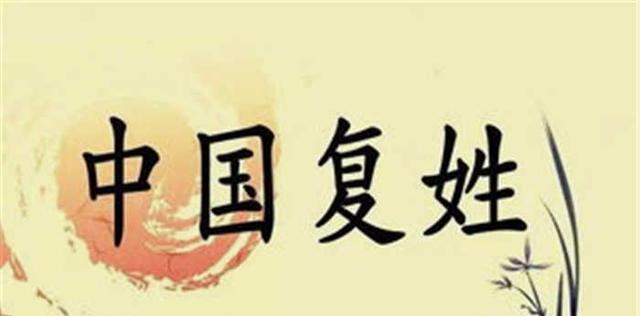preface
When it comes to compound surnames, the characters that come to mind are definitely very popular figures in history. For example, Zhuge Zhuge , Sima , Murong , Yuwen , etc. Even the world's best masters in martial arts novels are mostly compound surnames. What Ouyang invincible, Ximen blowing snow, Oriental undefeated, Ling Fox Chong and so on. Compound surnames always give us a feeling of high pressure and strong. How did these compound surnames come about? Why is it almost extinct now?

Derived from the official name
From the pre-Qin period onwards, many official positions were hereditary, and these official positions were usually monopolized by a single family. Sima (司馬), Situ (司图), Sikong (司空), etc. (司空), etc. belonged to such official positions in ancient times. Sima was in charge of the terracotta army, Situ was in charge of the land people, and Sikong was in charge of water conservancy construction. These official positions are high and powerful, very prominent, and as a family hereditary, it is also very normal to use the official position as a surname.
"Li Ji Qu Li Xia": "The five senses of the Son of Heaven, known as Situ, Sima And Sikong, Si Shi, Si Kou, and the Five Virtues of the Diansi." ”
During the reign of King Xuan of Zhou, Cheng Boxiu's father held the post of Sima Shi, and the descendants of Cheng Boxiu's father continued his position, and his descendants were called Sima Shi. Of course, it is not only the compound surname that takes the official position as the surname, but many single surnames also come from the official position.
The surname Shi originated from the Taishi official; after the Li surname was Gao Tao, Gao Tao served as Emperor Shun's Dali and was the official of punishment, Li and Li were connected; the surname Qian originated from the Western Zhou official Jiufu Quanren, Quan and Qian were connected; the Le surname was derived from "LeZheng".
Originated from fiefdoms and places of residence
In ancient times, some people who made great achievements would be enfeoffed by the Son of Heaven, and the descendants of these heroes would multiply and live in the fiefdoms of their ancestors and enjoy the glory and wealth brought to them by their ancestors. So they took Fengyi as their surname.
In the Spring and Autumn Period, King Huai of Chu made his younger son Lan the Grand Master of Shangguan Yi, and Zi Lan's descendants took the surname of Yi and called him Shangguan Shi.
Linghu was originally a place name in the Spring and Autumn Period, and one of the descendants of King Jichang of Zhouwen was named Wei Zhi (魏陳), and the Duke of Jin Jing gave him the area around Linghu as a fief, and Wei Jie,Wei Jie,' son, took the fief as his clan and changed his name to Ling Hu Jie.
In addition to fiefdoms, the place of residence is also the source of the compound surname. For example, the surname Ximen who lives in the western city gate area, the surname Dongguo who lives in the east of the city, and the Nangong and Baili are also place names.
Originated in a foreign land
There are also some compound surnames that are not Central Plains surnames, but come from foreign countries or ethnic minorities. For example, the surname of Hatsuma Zhi in the "Eight Parts of the Heavenly Dragon" is derived from Tianzhu . Japanese courtiers, Goryeo ancestors, etc. were all derived from these foreign immigrants.
In addition, there are also many Sinicized surnames among ethnic minorities, which are the Han surnames that many Hu people have changed into China, and they are also the compound surnames of the descendants of the ancient Hu people that we are all very familiar with. For example, Murong, Yuwen, Tuoba, Wei Chi, etc.
It is mentioned in the Chronicle of the Three Kingdoms and the Biography of Xianbei that during the reign of Emperor Huan of Han, Xianbei was divided into three parts: central, eastern, and western, with the central doctor Ke Zhique and Ju Murong Temple. The historical Xianbei people were between the Mulun River and the Tao'er River in present-day Inner Mongolia. Murong's birthplace and hometown are also here.
Where did the compound surnames go?
These compound surnames, which we are familiar with, seem to be difficult to meet in life, almost giving people a feeling of extinction. Where did they all go?
There are many reasons for this, and most of the compound surnames we are familiar with are linked to celebrities. In the change of history, some have to change their surnames because they were hunted down and killed by the enemy, some because they changed their surnames because of the change of residence, and some changed their surnames because of other reasons. For example, in modern times, many people change their surnames because of trouble and simplify.
But compound surnames are not extinct, but because the number is relatively small, we are usually difficult to meet. For such a large population base in China, the number of people with these surnames is too rare to give us the illusion of almost extinction.
At present, there are only about 28,000 people with the surname Sima in Henan, Shanxi and Shaanxi. There are about 75,000 descendants of Shangguan in Henan and about 42,000 descendants of Linghu in Shanxi.
There were many compound surnames in ancient China, 110 in the Tang Dynasty generation alone, and all the compound surnames in China from ancient times to the present day added up to 1982. In addition to the two-word compound surname, there are also three-character compound surnames and four-character compound surnames, etc., but there are only 81 double-character compound surnames still in use.